Although not, by popular consensus, a brilliant year generally, 2016 has been a good year for poetry: sales of poetry books topped £10m for the first time, a poet – Warsan Shire – featured on Beyonce’s latest album, Penguin reopened its poetry list, and, for the second year in a row, the Forward Prizes were cleaned up by women. The BBC even gave over a whole Saturday evening – an entire evening – to poetry with Railway Nation: A Journey in Verse.
Trend-wise, it’s been all about long poems and small publishers, difficult, avant-garde collections that open up with patient reading, and lyrical, political calls to action. Indeed, it seems the very terribleness of this year’s events has been the catalyst for poetry’s resurgence, with poems like Maggie Smith’s ‘Good Bones’ and Ross Gay’s ‘A Small Needful Fact’ capturing the grieving but defiant mood of the year best.
What follows, then, is our annual list of the poetry collections that blew our minds, the cobwebs out, and us away – chosen by your friendly, local Poetry School staff.
Key: WB (Will Barrett); AP (Andrew Parkes); JB (Julia Bird); JC (John Canfield); AL (Ali Lewis); SC (Sally Carruthers); JT (James Trevelyan).
White Hills by Chloe Stopa-Hunt (Clinic)
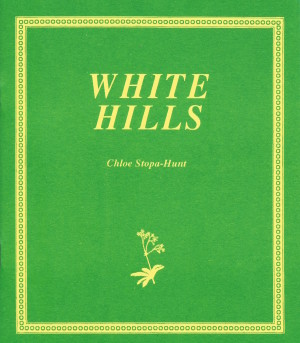 This was a Poetry Book Fair purchase – a greenery-yallery 28 page pamphlet, square as an Instagram photo. Inside, ominous assemblages of words – poems bleached down to their bones, full of vintage relics. Here’s ‘Education’ in its entirety ‘The lesson is: / Setting your / Night-burnt cheek / To the marble / Lion’s head. // A rain begins, Of red / Morning flowers / And fresh, / Sufficient light.’ Texture, analogy, colour, action … that’s me taught. JB
This was a Poetry Book Fair purchase – a greenery-yallery 28 page pamphlet, square as an Instagram photo. Inside, ominous assemblages of words – poems bleached down to their bones, full of vintage relics. Here’s ‘Education’ in its entirety ‘The lesson is: / Setting your / Night-burnt cheek / To the marble / Lion’s head. // A rain begins, Of red / Morning flowers / And fresh, / Sufficient light.’ Texture, analogy, colour, action … that’s me taught. JB
Meanwhile, Trees by Mark Waldron (Bloodaxe Books)
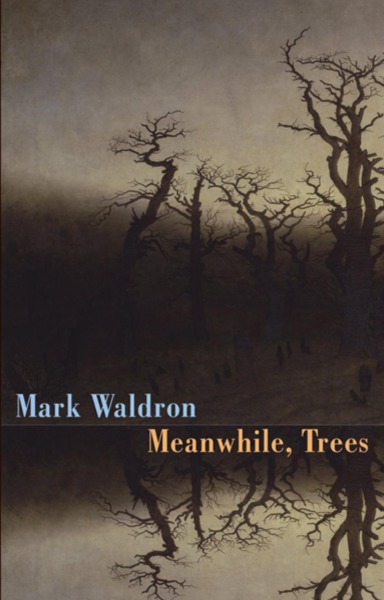 The five years since Mark Waldron’s previous collection have clearly been productive; this third book is full of extraordinary conceits, sparkling ingenuity and sardonic wit. The poems here are thoroughly considered in their strangenesses, work their premises hard and show a real joy in the play and dexterity of language. In that typical Waldron way, these narrators frequently start with some ludic silliness or vulgarity before somehow slipping, with almost impossible deftness, into abstraction, profundity and social commentary. ‘So I was at home doing the washing-up’ and the Manning sequence had me belly-laughing in public, while the dark denouement of ‘All my poems are advertisements for me’ is something I catch my unoccupied mind repeating over and over. AP
The five years since Mark Waldron’s previous collection have clearly been productive; this third book is full of extraordinary conceits, sparkling ingenuity and sardonic wit. The poems here are thoroughly considered in their strangenesses, work their premises hard and show a real joy in the play and dexterity of language. In that typical Waldron way, these narrators frequently start with some ludic silliness or vulgarity before somehow slipping, with almost impossible deftness, into abstraction, profundity and social commentary. ‘So I was at home doing the washing-up’ and the Manning sequence had me belly-laughing in public, while the dark denouement of ‘All my poems are advertisements for me’ is something I catch my unoccupied mind repeating over and over. AP
Look by Solmaz Sharif (Graywolf)
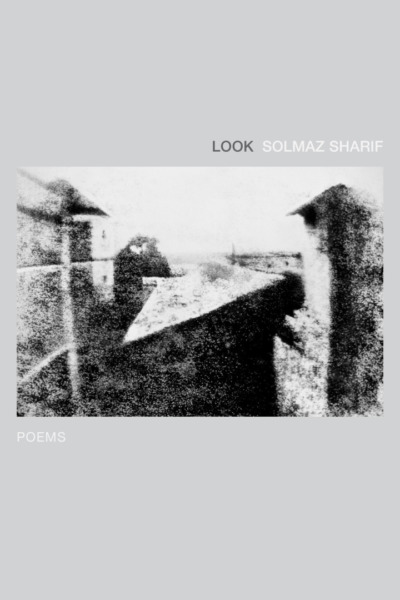
It’s a been a year notable for a whole new slew of insidious jargon – ‘fake news’ (propaganda), ‘alt right’ (white supremacy), ‘post-truth’ (lying) – even ‘Brexit’ suggested a kind of fun, cosy familarity when pitched against ‘Project Fear’, a comparison that trivialised the complex political and constitutional consequences the referendum posed. Such rhetorical re-branding, often used to minimise the horrifying reality to the point of normalcy, is massively troubling. Look by Solmaz Sharif, then, comes as an important corrective against the weaponised rhetoric we now confront daily in the media and in our personal lives. Look regularly asks us to do exactly that – look – by detonating the Newspeak of government departments and the military, scrutinizing and re-framing the deeper meaning of such language, sometimes turning it against itself. It is sometimes hard not to look away, which of course is exactly the point – we should feel horrified by what is happening in the world, and how complicit and helpless we have become. So long as we allow ourselves to be distracted or misled by political speech and the language war is cloaked in, it will prevail, and for evil to transpire all that is required is for good men to do nothing. We must look. WB
Faber New Poets 15 – Sam Buchan-Watts (Faber)
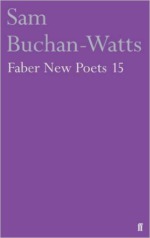 I rushed to the LRB to buy this pamphlet after seeing Sam perform in London at the showcase for this year’s Eric Gregory Award winners. In what was an especially inspiring evening from a bumper crop of the UK’s best young poets, Sam’s work was the pick for me: ethereal and dream-like, but rooted in the experience and language of the everyday – see poems on a two-tier truck of livestock where the ‘upright pigs / inside have no apparent end’ and on plastic bags stuffed between dishwasher and unit hanging ‘ominous as B-movie graveyard mist’. The stand-out poem for me – ‘The Days Go Just Like That’ – sees the speaker emerge from ‘the glove of woods’ to chance upon a medieval re-enactment and best displays Sam’s unique trail towards poetic discovery that has me eagerly awaiting a first collection: ‘then you have seen it exactly as it should be seen: / exposed but distant, so that the quirks… / are so correct, as if history were a thing to be administered / amidst the afternoon’. JT
I rushed to the LRB to buy this pamphlet after seeing Sam perform in London at the showcase for this year’s Eric Gregory Award winners. In what was an especially inspiring evening from a bumper crop of the UK’s best young poets, Sam’s work was the pick for me: ethereal and dream-like, but rooted in the experience and language of the everyday – see poems on a two-tier truck of livestock where the ‘upright pigs / inside have no apparent end’ and on plastic bags stuffed between dishwasher and unit hanging ‘ominous as B-movie graveyard mist’. The stand-out poem for me – ‘The Days Go Just Like That’ – sees the speaker emerge from ‘the glove of woods’ to chance upon a medieval re-enactment and best displays Sam’s unique trail towards poetic discovery that has me eagerly awaiting a first collection: ‘then you have seen it exactly as it should be seen: / exposed but distant, so that the quirks… / are so correct, as if history were a thing to be administered / amidst the afternoon’. JT
The Met Office Advises Caution by Rebecca Watts (Carcanet)
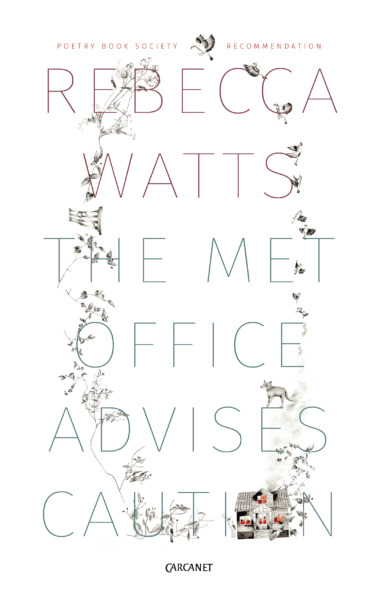 Well edited, deceptively simple, quietly shrewd. As title suggests, prepare for rain, wind and sky, animals, much else besides, and some surprising cutting social commentary that I was not expecting. Meteorological disturbances aside, it’s truly lovely group of articulate, intelligible, clean, clear-sighted poems, which despite their unassuming exteriors, belie the scuttle of enigmatic presences beneath. WB
Well edited, deceptively simple, quietly shrewd. As title suggests, prepare for rain, wind and sky, animals, much else besides, and some surprising cutting social commentary that I was not expecting. Meteorological disturbances aside, it’s truly lovely group of articulate, intelligible, clean, clear-sighted poems, which despite their unassuming exteriors, belie the scuttle of enigmatic presences beneath. WB
Wound by Richard Scott (Rialto)
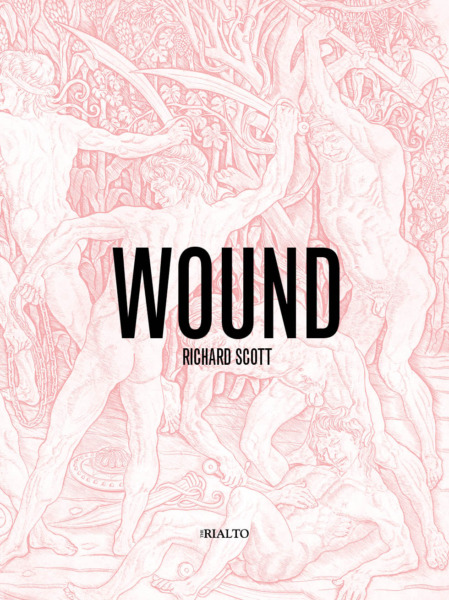 A wonderful pamphlet from a writer who will undoubtedly be a major voice in the UK poetry scene over the coming years. Richard Scott’s Wound is a brave, dangerous and self-assured debut that takes an unflinching look at sexuality and the experiences that leave their marks on us. In poems that take place behind veils of steam or hanging apple blossom, inside grimy cubicles or battered Transit vans, the reader is invited to witness up close the often uncomfortably intertwined notions of vulnerability, violation and sexual desire. Scott’s language as blunt as it is rhapsodic – ‘Hang me up butcher – my nape is ripe for your hook!’ – is surgical in its precision, shining a light to our personal and collective scars and picking away at the stitches. JT
A wonderful pamphlet from a writer who will undoubtedly be a major voice in the UK poetry scene over the coming years. Richard Scott’s Wound is a brave, dangerous and self-assured debut that takes an unflinching look at sexuality and the experiences that leave their marks on us. In poems that take place behind veils of steam or hanging apple blossom, inside grimy cubicles or battered Transit vans, the reader is invited to witness up close the often uncomfortably intertwined notions of vulnerability, violation and sexual desire. Scott’s language as blunt as it is rhapsodic – ‘Hang me up butcher – my nape is ripe for your hook!’ – is surgical in its precision, shining a light to our personal and collective scars and picking away at the stitches. JT
Void Studies by Rachael Boast (Picador)
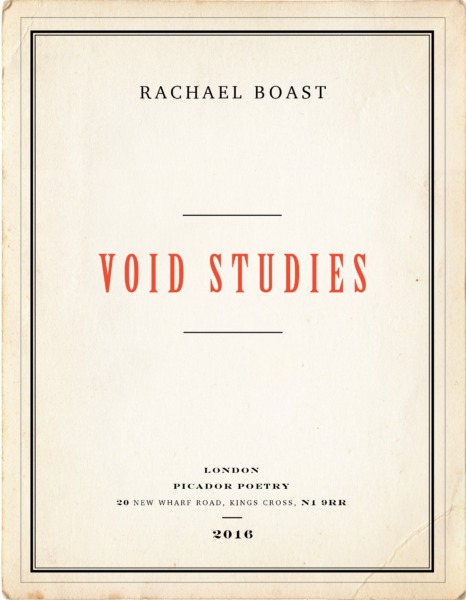 Rachael Boast’s Void Studies is described as the realisation of a project proposed by Symbolist poet Arthur Rimbaud: a series of musical études that don’t rely on narrative or aim to communicate any ‘meaning’, but instead conjure moods, emotions and atmospheres. And in this project, Boast is wholly successful. The poems are beautifully light and buoyant – shifting easily between the concrete and abstract – and, through some linguistic alchemy, manage to generate truly sensory experiences. The craft in these poems is absolutely extraordinary: they are formally tight but feel open and airy – permeated by a gentle rhythm that presses forwards, while their enjambment and sparse punctuation allow for flex and fluidity; leitmotifs chime gracefully with earlier poems and those yet to come. It is a work of great melody and harmony and one I foresee returning to. AP
Rachael Boast’s Void Studies is described as the realisation of a project proposed by Symbolist poet Arthur Rimbaud: a series of musical études that don’t rely on narrative or aim to communicate any ‘meaning’, but instead conjure moods, emotions and atmospheres. And in this project, Boast is wholly successful. The poems are beautifully light and buoyant – shifting easily between the concrete and abstract – and, through some linguistic alchemy, manage to generate truly sensory experiences. The craft in these poems is absolutely extraordinary: they are formally tight but feel open and airy – permeated by a gentle rhythm that presses forwards, while their enjambment and sparse punctuation allow for flex and fluidity; leitmotifs chime gracefully with earlier poems and those yet to come. It is a work of great melody and harmony and one I foresee returning to. AP
Holy Toledo! by John Clegg (Carcanet)
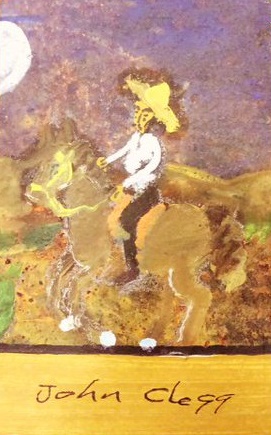
There aren’t many books that can claim a diversity of references as varied as Yvor Winters, F.R. Leavis, Buffy Summers, Abraham Zapruder and Rilke, but in John Clegg’s second book he threads together an astonishing tapestry of knowledge, literary history and intellectual curiosity with a poetic ease and a confident swagger worthy of Kris Kristofferson, himself. JC
Wife by Tiphanie Yanique (Peepal Tree Press)
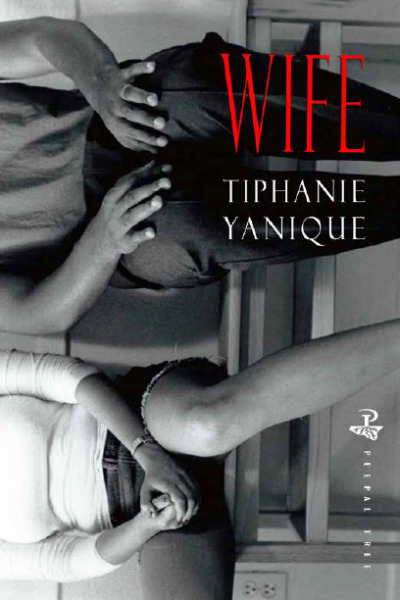
An undoubtedly worthy winner of this year’s Forward Prize for Best First Collection, Yanique’s measured poetry and stunning performance at Royal Festival Hall on the night of her win had me reaching for this collection. ‘Dictionary’ sets the tone – one of the book’s remarkable prose poems –examining a range of definitions of the titular ‘wife’ – ‘get wife’, ‘wifey’, ‘to wife’ – asking the reader to consider the misogyny inherent in each origin and, of course, in the very notion of definitions. This is a book that challenges language, which urgently spends time dismantling and reimagining the words familiar to us in both the domestic setting and wider society. Directly confronting subjects of womanhood, colonialism and the body, Wife, like Rankine’s Citizen the previous year, feels like an important book to keep close at hand as we leave 2016. JT
Night Sky with Exit Wounds by Ocean Vuong (Copper Canyon Press)
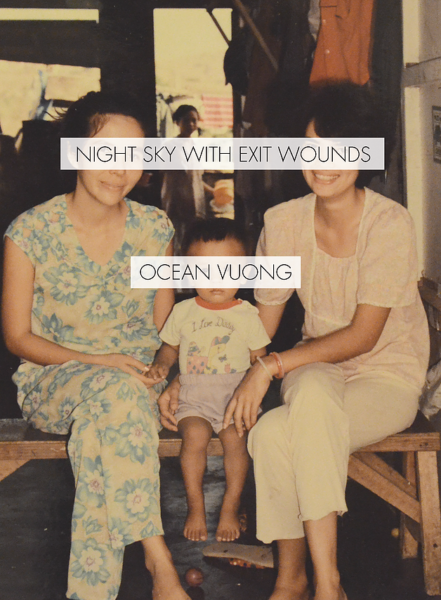 This isn’t technically out in the UK till May 2017, but it’s been available in e-book form from its American publishers since early this year, and it’s simply too good not to be included. Urgent, shocking, lyrical and cinematic, it had me at line 4 – “the rain / falling through him: guitar strings snapping / over his globed shoulders”. It’s by no means an easy book, both formally and in subject matter, but it’s been a year of difficult, taut, grief-filled poetry, and I think this is the pick of the bunch. AL
This isn’t technically out in the UK till May 2017, but it’s been available in e-book form from its American publishers since early this year, and it’s simply too good not to be included. Urgent, shocking, lyrical and cinematic, it had me at line 4 – “the rain / falling through him: guitar strings snapping / over his globed shoulders”. It’s by no means an easy book, both formally and in subject matter, but it’s been a year of difficult, taut, grief-filled poetry, and I think this is the pick of the bunch. AL
The Remedies by Katharine Towers (Picador)
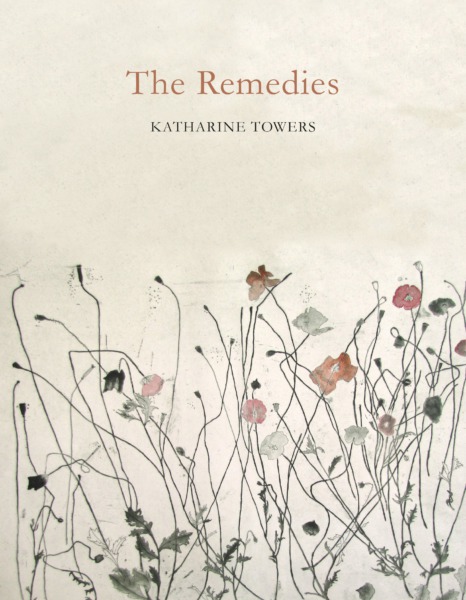 A knowledgeable and empathetic second collection centred on a sequence of flower poems in which each plant is “imagined to be afflicted with the difficulty for which it is a cure”. It’s not (or not just) the cohesiveness and broad sweep of this collection that’s so impressive, rather it’s the small acts of noticing that are so deft and precise as to be almost definitive. Here’s ‘Pilgrim’ in its entirety: ‘Think of the mole in his crib of earth, / blind to the truth, / lifting his hands in prayer.’ AL
A knowledgeable and empathetic second collection centred on a sequence of flower poems in which each plant is “imagined to be afflicted with the difficulty for which it is a cure”. It’s not (or not just) the cohesiveness and broad sweep of this collection that’s so impressive, rather it’s the small acts of noticing that are so deft and precise as to be almost definitive. Here’s ‘Pilgrim’ in its entirety: ‘Think of the mole in his crib of earth, / blind to the truth, / lifting his hands in prayer.’ AL
Spitting Distance by Mark Pajak, Dora Incites The Sea-Scribber to Lament by Geraldine Clarkson, Complicity by Tom Sastry, There Was And How Much There Was by Zeina Hashem Beck (The Poetry Business)
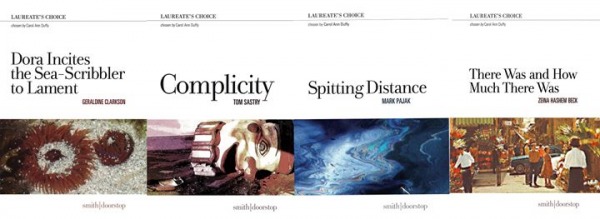 A thrilling quartet of new voices from The Poetry Business, from the delightful ostranie (making strange/defamiliarisation) and mercurial diction of Geraldine Clarkson, to Tom Sastry’s dexterious ability to pivot mid-sentence from sassy deadpan to the ruinously heartfelt. Whether it was Zeina Hashem Beck’s fearless reflections on female body politics, or Mark Pajak’s simply astonishing description of listening to the noise of your neighbours have sex, these poets were the second best thing I received in the post in 2016 (the first was a letter from the Inland Revenue telling me I had only 79p to pay for the last accounting year). WB
A thrilling quartet of new voices from The Poetry Business, from the delightful ostranie (making strange/defamiliarisation) and mercurial diction of Geraldine Clarkson, to Tom Sastry’s dexterious ability to pivot mid-sentence from sassy deadpan to the ruinously heartfelt. Whether it was Zeina Hashem Beck’s fearless reflections on female body politics, or Mark Pajak’s simply astonishing description of listening to the noise of your neighbours have sex, these poets were the second best thing I received in the post in 2016 (the first was a letter from the Inland Revenue telling me I had only 79p to pay for the last accounting year). WB
Penguin Modern Poets 2: Controlled Explosions by Michael Robbins, Patricia Lockwood and Timothy Thornton (Penguin)
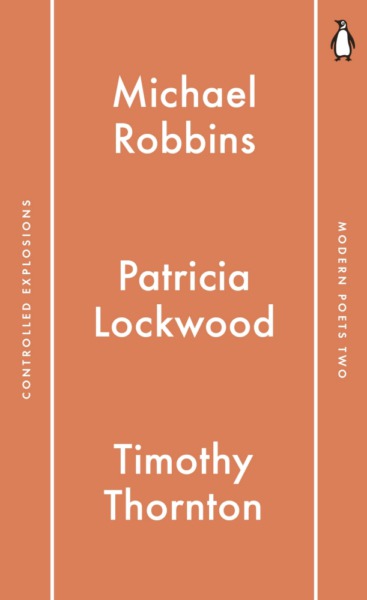 The second volume of the recently revived Penguin Modern Poets series groups the strange, recursive, and musical work of composer and writer Timothy Thornton, whose poem on Anthony Head’s head is a highlight of the book, with the exuberant and satirical Michael Robbins whose madcap rhymes propel his surreal, formal poems, and the sharp, funny, downright brilliant Patricia Lockwood. Lockwood’s poem ‘Rape Joke’, included in this selection, went viral in 2013 and remains one of the best poems of the 2010s. The Guardian said it “casually reawakened a generation’s interest in poetry”. AL
The second volume of the recently revived Penguin Modern Poets series groups the strange, recursive, and musical work of composer and writer Timothy Thornton, whose poem on Anthony Head’s head is a highlight of the book, with the exuberant and satirical Michael Robbins whose madcap rhymes propel his surreal, formal poems, and the sharp, funny, downright brilliant Patricia Lockwood. Lockwood’s poem ‘Rape Joke’, included in this selection, went viral in 2013 and remains one of the best poems of the 2010s. The Guardian said it “casually reawakened a generation’s interest in poetry”. AL
The Number Poems by Matthew Welton (Carcanet)
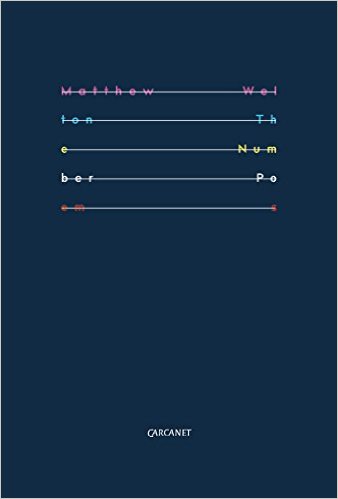
Murakami has his cats, and for Matthew Welton: he has his coffee. And for much of The Book of Numbers, his third collection, Welton sits at his kitchen table, cafetiere close at hand, drinking coffee and playing language games with the ordinary stuff of everyday life: coffee, waffles, mouthwash, fruit bowls, wasps, clouds. But these are no ordinary language games: Welton is a systems genius, and The Book of Numbers showcases his technical brilliance and rigorous precision with pattern and form again and again, not least the frankly staggering sequence ‘Melodies for the Meanwhile’. What makes The Book of Numbers so special, however, is how much it appeals to the heart as well as the head. Such rule and procedure-based work can easily become supercilious, but Welton is striking after something much more profound here, in search of answers in the gap that falls between the abstract imagination and the real world of things. The ghost of Wallace Stevens looms (the use of the word ‘grackle’ cannot be an accident), giving the collection an almost theological flavour. Could it be that Welton, our great poetry mathematician, is a philosopher after all? WB
Brother by Matthew Dickman and Michael Dickman (Faber)
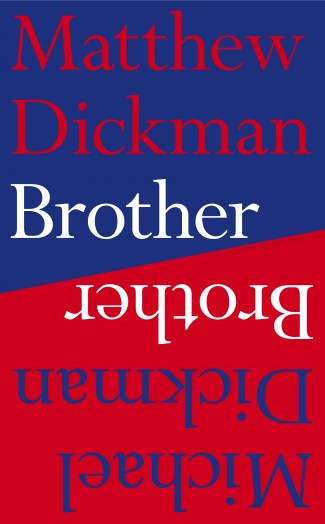 Head to toe in one volume, twin brothers Matthew and Michael Dickman approach their elder brother’s suicide from angle after angle, trying to find the perspective from which it makes sense – as if any writer or brother ever could make sense of such an event. ‘I want the ground / my brother is buried in / to be the field that I am standing on. So we can be together.’ writes Matthew in ‘Field’. ‘I whispered To the rescue / and sat / on the dead edge / of my bed / all night and / all morning’ answers Michael in ‘Dead Brother Superhero’. This heart-breaking double collection peeled a bit of me away: it made me question my own relationship with vulnerability, powerfully and uncomfortably. JB
Head to toe in one volume, twin brothers Matthew and Michael Dickman approach their elder brother’s suicide from angle after angle, trying to find the perspective from which it makes sense – as if any writer or brother ever could make sense of such an event. ‘I want the ground / my brother is buried in / to be the field that I am standing on. So we can be together.’ writes Matthew in ‘Field’. ‘I whispered To the rescue / and sat / on the dead edge / of my bed / all night and / all morning’ answers Michael in ‘Dead Brother Superhero’. This heart-breaking double collection peeled a bit of me away: it made me question my own relationship with vulnerability, powerfully and uncomfortably. JB
The Days that Followed Paris by Paul Stephenson (HappenStance)
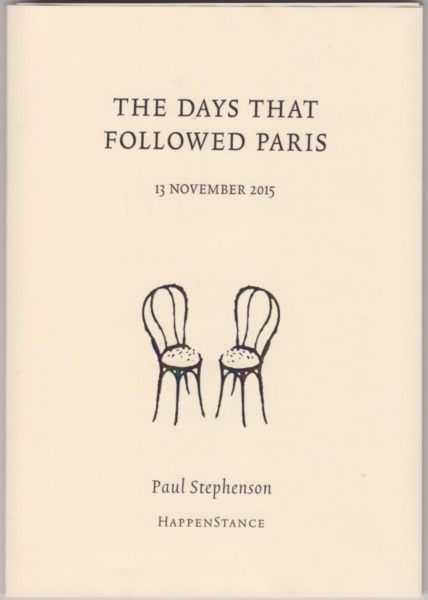
A truly memorable example of personal trauma intertwined with a city and nation’s pain and anger, distilled, with a critical eye and heart, into poems surgically precise and with a clarity that is extraordinary. All these elements combine to force the reader to stare into and question the abyss of our political and ideological present. SC
Sunshine by Melissa Lee-Houghton (Penned in the Margins)
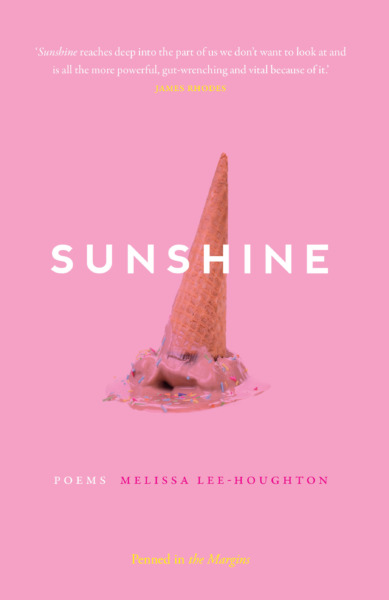 Sunshine, the third collection from Melissa Lee-Houghton – which has been shortlisted for the Costa Book Awards and contains the Forward Prize nominated ‘i am very precious’ – is a simply astonishing book: it overflows with expansive, intense and troubling poems that leave a lasting impression. Lee-Houghton employs a long-form approach to confessional lyric poetry here and, somehow, in this sprawling style, manages to generate sense and order from her chaotic subject matter: mental health, violence and desire in a twenty-first century permeated by social media, austerity politics and internet pornography. The poem ‘Loneliness’ is one to which I return again and again, just to witness the astounding precision with which Lee-Houghton expresses the complexity of simultaneously experiencing all-consuming love and total isolation in the presence of another. AP
Sunshine, the third collection from Melissa Lee-Houghton – which has been shortlisted for the Costa Book Awards and contains the Forward Prize nominated ‘i am very precious’ – is a simply astonishing book: it overflows with expansive, intense and troubling poems that leave a lasting impression. Lee-Houghton employs a long-form approach to confessional lyric poetry here and, somehow, in this sprawling style, manages to generate sense and order from her chaotic subject matter: mental health, violence and desire in a twenty-first century permeated by social media, austerity politics and internet pornography. The poem ‘Loneliness’ is one to which I return again and again, just to witness the astounding precision with which Lee-Houghton expresses the complexity of simultaneously experiencing all-consuming love and total isolation in the presence of another. AP
The Colour of James Brown’s Scream by Kayombo Chingonyi (Akashic Books)
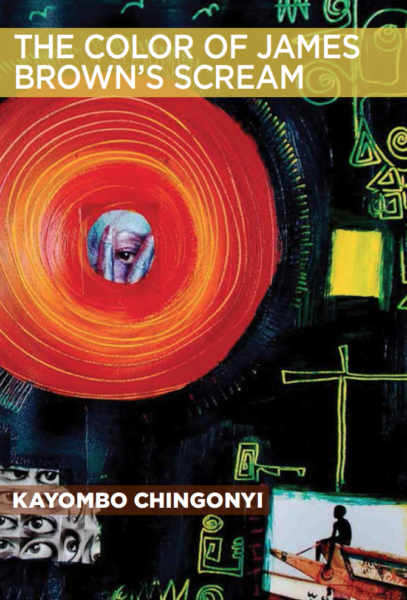
Published by Akashic Books as part of the African Poetry Book fund, Chingonyi’s second pamphlet (Some Bright Elegance was published by Salt in 2012) is full of the music, inventiveness, passion and coolness that make him once of the most exciting poets around to read and to hear read. His debut collection is published by Chatto next year, and you can put money on it appearing on next year’s best books lists. JC
Voyage by Sophie Herxheimer and Karen McCarthy Woolf (National Maritime Museum)
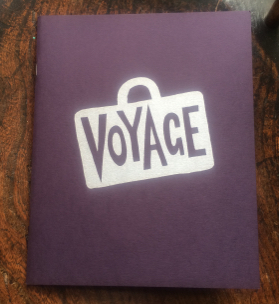 Last year, Sophie and Karen (two beloved Poetry School tutors) were artists in residence at the National Maritime Museum, exploring the theme of migration with visitors. Sophie elicited and illustrated stories from visitors whose roots cross the world, from Pakistan to Eritrea to Colombo and round again, and those illustrations are interspersed with Karen’s poems which pick apart and reassemble ideas of displacement and gentrification. A gorgeously produced object, its poems and black ink illustrations soak into the fluffy cream stock of the main body of the pamphlet and its alternating brown wrapping paper pages. At this year’s Poetry Book Fair, I was struck by the number of new small presses lavishing attention and gold leaf on covetable, pocketable short run poetry books. This is one such book, smuggling hard truths beneath its beauty. JB
Last year, Sophie and Karen (two beloved Poetry School tutors) were artists in residence at the National Maritime Museum, exploring the theme of migration with visitors. Sophie elicited and illustrated stories from visitors whose roots cross the world, from Pakistan to Eritrea to Colombo and round again, and those illustrations are interspersed with Karen’s poems which pick apart and reassemble ideas of displacement and gentrification. A gorgeously produced object, its poems and black ink illustrations soak into the fluffy cream stock of the main body of the pamphlet and its alternating brown wrapping paper pages. At this year’s Poetry Book Fair, I was struck by the number of new small presses lavishing attention and gold leaf on covetable, pocketable short run poetry books. This is one such book, smuggling hard truths beneath its beauty. JB
Jackself by Jacob Polley (Picador)
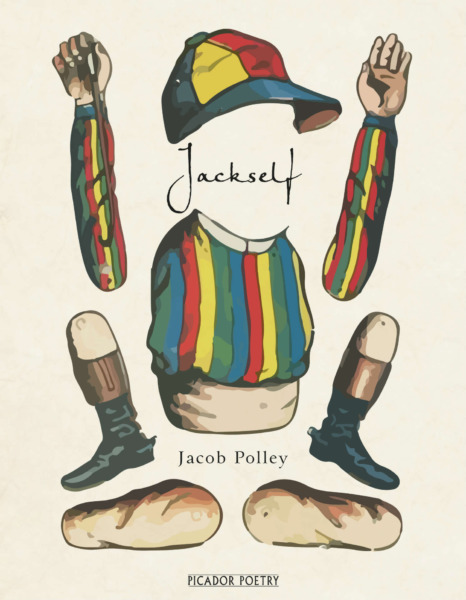 Jackself re-imagines the author’s childhood in rural Cumbria, at a time of encroaching urbanisation, via a series of spectacular, fabulistic vignettes set in the dark, rural parallel world of Lamanby, which we can surely add to the great fictional residences of children’s literature along with Trumpton, Farthing Wood, Toyland, Toad Hall, and 100 Acre Wood. In fact, the book put me in mind of many television shows and books I loved as a child – Watership Down, Fox Tales, Oakey Doke, Ted Hughes’ animal poems – and shares with these both a deep love of British folklore, with an unsentimental treatment of childhood and the natural world. The poems in Jackself are suitably junglelike, lines splaying across the page in every direction, in a variety of oddly elusive and bulging forms evocative of the dark forest floors of Lamanby, the ‘home of shadows’, a magickal place teeming with a cast of characters that would put Oliver Postgate to shame – Jackself, our knee-high protagonist, his friend Jeremy Wren, Lucy Fur, and a litany of alter-egos inspired by the Jacks of English legend: Jack Frost, Jack O Lantern, Blackjack, Spring-heeled Jack. It is a beautiful book, a work of real, raw imagination that balances frivolity with caustic bite, and one that probably would suit a description like ‘tatterdemalion fantasia’, but you know, I don’t want to be that guy. WB
Jackself re-imagines the author’s childhood in rural Cumbria, at a time of encroaching urbanisation, via a series of spectacular, fabulistic vignettes set in the dark, rural parallel world of Lamanby, which we can surely add to the great fictional residences of children’s literature along with Trumpton, Farthing Wood, Toyland, Toad Hall, and 100 Acre Wood. In fact, the book put me in mind of many television shows and books I loved as a child – Watership Down, Fox Tales, Oakey Doke, Ted Hughes’ animal poems – and shares with these both a deep love of British folklore, with an unsentimental treatment of childhood and the natural world. The poems in Jackself are suitably junglelike, lines splaying across the page in every direction, in a variety of oddly elusive and bulging forms evocative of the dark forest floors of Lamanby, the ‘home of shadows’, a magickal place teeming with a cast of characters that would put Oliver Postgate to shame – Jackself, our knee-high protagonist, his friend Jeremy Wren, Lucy Fur, and a litany of alter-egos inspired by the Jacks of English legend: Jack Frost, Jack O Lantern, Blackjack, Spring-heeled Jack. It is a beautiful book, a work of real, raw imagination that balances frivolity with caustic bite, and one that probably would suit a description like ‘tatterdemalion fantasia’, but you know, I don’t want to be that guy. WB
Trouble by Alison Winch (The Emma Press)
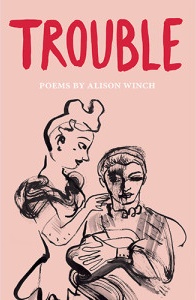 This pamphlet from the Emma Press is all texture: sharp, soft, hot and cold. It draws together experience, introspection and a hunger for understanding and trying to make sense of the world. It turns an eye on female experience and universal concerns: power, love, sex and motherhood. It’s playful, challenging, funny and bold. JC
This pamphlet from the Emma Press is all texture: sharp, soft, hot and cold. It draws together experience, introspection and a hunger for understanding and trying to make sense of the world. It turns an eye on female experience and universal concerns: power, love, sex and motherhood. It’s playful, challenging, funny and bold. JC
Say Something Back by Denise Riley (Picador)
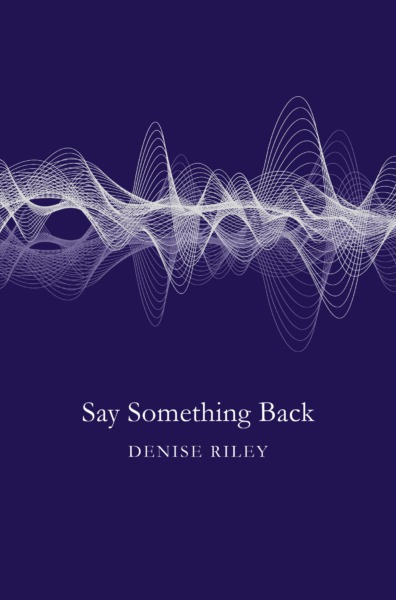 Say Something Back shows Denise Riley at the height of her powers, surgically probing the elegiac lyric to ask vital questions on poetry’s role in processing grief. These poems function like keyholes, offering glimpses of fully realised and intricate worlds – frequently permeated by nostalgia, sadness and loss, but also with moments of touching humour. Riley’s technique here is simply remarkable: every poem is tightly crafted and leaves a lasting impact without ever feeling overwrought or laboured. Say Something Back has been justly lauded for some time now, right from the first publishing of its central elegy ‘A Part Song’ in 2012, and will go down as one of the most important works of this decade. AP
Say Something Back shows Denise Riley at the height of her powers, surgically probing the elegiac lyric to ask vital questions on poetry’s role in processing grief. These poems function like keyholes, offering glimpses of fully realised and intricate worlds – frequently permeated by nostalgia, sadness and loss, but also with moments of touching humour. Riley’s technique here is simply remarkable: every poem is tightly crafted and leaves a lasting impact without ever feeling overwrought or laboured. Say Something Back has been justly lauded for some time now, right from the first publishing of its central elegy ‘A Part Song’ in 2012, and will go down as one of the most important works of this decade. AP
CAIN by Luke Kennard (Penned in the Margins)
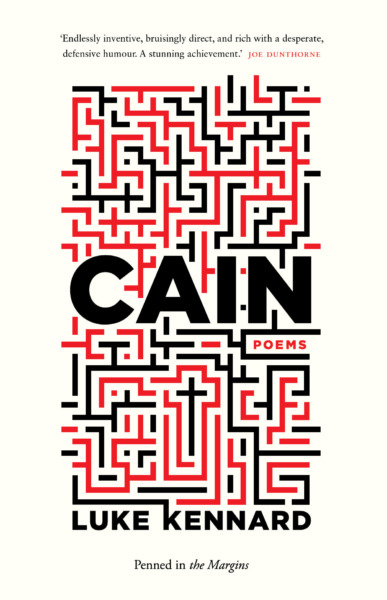
In CAIN Luke Kennard plays the character ‘Luke Kennard’, who is visited by the Bibical murderer, Cain, after the collapse of his marriage. One of the Lukes is probably mad. Here’s an excerpt:
‘You don’t need to explain
a game called Juxtapotatoes:
Just put a potato next to something.
We’ll figure out the rest.’
And I’m not even going to go into The Anagrams. Just buy the book. WB
<<<<<<<<<<<>>>>>>>>>>
That’s it! Agree? Disagree? Please add your top books to the comments below…
Here’s the list again, in no particular order:
1 – Wound by Richard Scott (Rialto)
2 – Meanwhile, Trees by Mark Waldron (Bloodaxe)
3 – Sunshine by Melissa Lee-Houghton (Penned in the Margins)
4 – Void Studies by Rachael Boast (Picador)
5 – Night Sky With Exit Wounds by Ocean Vuong (Copper Canyon Press)
6 – Faber New Poets 15 by Sam Buchan-Watts (Faber)
7 – White Hills by Chloe Stopa-Hunt (Clinic)
8 – Wife by Tiphanie Yanique (Peepal Tree)
9 – CAIN by Luke Kennard (Penned in the Margins)
10 – Jackself by Jacob Polley (Picador)
11 – The Number Poems by Matthew Welton (Carcanet)
12 – Voyage by Sophie Herxheimer and Karen McCarthy Woolf (National Maritime Museum)
13 – Penguin Modern Poets 2: Controlled Explosions – Michael Robbins, Patricia Lockwood, Timothy Thornton (Penguin)
14 – The Remedies by Katharine Towers (Picador)
15 – Look by Solmaz Sharif (Graywolf)
16 – Spitting Distance by Mark Pajak (The Poetry Business)
17 – Dora Incites The Sea-Scribber to Lament by Geraldine Clarkson (The Poetry Business)
18 – Complicity by Tom Sastry (The Poetry Business)
19 – There Was And How Much There Was by Zeina Hashem Beck (The Poetry Business)
20 – Brother by Matthew and Michael Dickman (Faber)
21- Holy Toledo! by John Clegg (Carcanet)
22 – Trouble by Alison Winch (Emma Press)
23 – Say Something Back by Denise Riley (Picador)
24 – The Colour of James Brown’s Scream by Kayombo Chingonyi (Akashic Books)
25 – The Met Office Advises Caution – Rebecca Watts (Carcanet)
26 – The Days that Followed Paris – Paul Stephenson (HappenStance)
[…] pamphlet ‘The Days That Followed Paris’ was one of the Poetry School’s ‘Books of the Year’, published on our blog. You do read our blog, don’t […]
Some super collections here. Is it too late to add a couple of 2016 collections? Do you need to receive copies to assess them before titles to go on the list? If so, to whom should they be posted?
Frances White
Hi Frances! Thank you! This was just a list of the favourite collections of Poetry School staff for 2016, so not necessarily something to be “submitted for” so to speak – although we’d love to know your own favourites!
If you would like books reviewed as part of our new Reviews blogs then you can send them to us directly at the Poetry School office. We’re looking to publish up-to-the-minute criticism though (and get a lot of submissions), so it’s unlikely anything published more than a couple of months ago would be reviewed. Do email me (administration[at]poetryschool.com) to discuss though!
All the best,
James